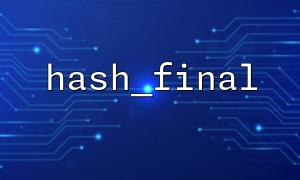In PHP, hash_init and hash_final functions are usually used together to perform hash calculations of data. hash_init is used to initialize a hash context, and hash_final is used to output the final hash value. However, when using these two functions, programmers often encounter common errors that cause the hash calculation to fail or the result is in incorrect. This article will explore these common mistakes and how to fix them effectively.
After initializing the hash context with hash_init , you need to use the hash_update function to update the hash data. If you forget this step, hash_final will not calculate any data, resulting in an empty hash value being returned.
Error example :
$hash_context = hash_init('sha256');
$final_hash = hash_final($hash_context); // No call hash_update,The result is empty
echo $final_hash;
Fix method :
Before calling hash_final , hash_update must be used to provide the data that needs hash.
$hash_context = hash_init('sha256');
hash_update($hash_context, 'The data that needs to be calculated');
$final_hash = hash_final($hash_context);
echo $final_hash;
The first parameter of the hash_init function is the hash algorithm type, such as sha256 , md5 , etc. If an unsupported algorithm is selected, hash_init will return false , and hash_final will not return the correct result.
Error example :
$hash_context = hash_init('nonexistent_algorithm'); // Use unsupported algorithms
$final_hash = hash_final($hash_context);
echo $final_hash;
Fix method :
Make sure to use supported hashing algorithms, common ones such as sha256 , sha1 , md5 , etc.
$hash_context = hash_init('sha256'); // Use supported algorithms
hash_update($hash_context, 'Correct hash data');
$final_hash = hash_final($hash_context);
echo $final_hash;
After hash_init is initialized, a hash context object will be returned. If the hash_final parameter is wrongly set to data of non-hash context type, PHP will report an error or return an incorrect result.
Error example :
$hash_context = 'string_instead_of_context'; // Incorrect data type
$final_hash = hash_final($hash_context);
echo $final_hash;
Fix method :
Make sure that the parameter of hash_final is the hash context object correctly returned by hash_init .
$hash_context = hash_init('sha256');
hash_update($hash_context, 'Correct hash data');
$final_hash = hash_final($hash_context);
echo $final_hash;
Sometimes, forgetting to clear the context when using hash calculations multiple times will affect subsequent calculations. hash_init creates a new context for each hash calculation, and if you don't clean it up, it may mix the results of multiple calculations.
Error example :
$hash_context = hash_init('sha256');
hash_update($hash_context, 'data1');
$final_hash1 = hash_final($hash_context);
hash_update($hash_context, 'data2'); // Context not cleared,data会被错误混合
$final_hash2 = hash_final($hash_context);
echo $final_hash1 . PHP_EOL;
echo $final_hash2 . PHP_EOL;
Fix method :
Before each calculation, reinitialize the hash context to ensure that the hash results of different data are not mixed.
$hash_context = hash_init('sha256');
hash_update($hash_context, 'data1');
$final_hash1 = hash_final($hash_context);
$hash_context = hash_init('sha256'); // Reinitialize
hash_update($hash_context, 'data2');
$final_hash2 = hash_final($hash_context);
echo $final_hash1 . PHP_EOL;
echo $final_hash2 . PHP_EOL;
When using hash_init and hash_final in PHP, common errors mainly involve the management of hash context, algorithm selection and data update. These errors can be avoided by correctly updating data with hash_update , ensuring the supported algorithms are selected and the hash context is properly handled, and these errors can be avoided to ensure the correct hash calculation.
By understanding these common errors and fixing them, you will be able to effectively use these functions for hashing, improving the stability and reliability of your code.















